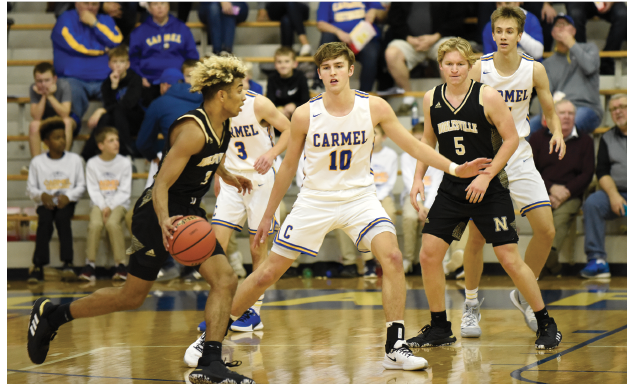This season, Peter Suder, varsity basketball player and sophomore, was ranked in the top 50 nationally for the class of 2022. As a top-ranked athlete, several elite colleges have approached Suder, ever since he was 13 years old.
According to Suder, college coaches started watching him play during seventh grade. After that season ended, he said he gained a new understanding of the recruitment process and the new implications that came with playing the sport he loved.
“At first there was a lot more pressure that came with playing in front of coaches and knowing that I had to perform my best every time,” Suder said. “A lot of people don’t really know what they want to do when they are in seventh or eighth grade. The first exposure to colleges made everything move a little faster.”
But as early recruitment becomes more prevalent, colleges have been under more scrutiny because many young student athletes are not ready—mentally or physically—for the intense recruitment process.
Kelsie James, varsity soccer player and senior, said she also felt the pressure of recruitment from a young age. James, who committed to Valparaiso University her freshman year, said that the process of early recruiting was stressful.
“There is definitely pressure because it is such a big decision to make at a younger age. It’s not just a decision for you but also for your family,” James said.
According to the National Collegiate Athletic Association (NCAA), 37% of female soccer players, like James, are recruited early and committed prior to the end of their sophomore year.
Athletics Director Jim Inskeep said he acknowledges this increasing prevalence of early recruitment, but says it doesn’t give student athletes enough time to take all of their best interests to heart.
“The early recruitment process has a lot of benefits and things to offer, but that’s only if you know what you want,” Inskeep said. “I think the biggest question is if the school you are committing to is the right one for your major, not for your sport or the coach.”
This new trend of early recruitment has sparked a conversation about new rule implementations to combat recruiting athletes prior to high school. Inskeep said he is in favor of these rules.
Inskeep said, “The early recruiting ends up hurting most players. However, at the same time, if you are a college coach and if you don’t recruit young players, and a rival college ends up getting that player, then people start to criticize you. Rules need to be in place so that players are given more time to decide.”
Although Suder acknowledged the negative consequences associated with early recruitment, he said he saw the added benefits, such as better scholarships.
“I think one of the advantages of committing early is that there are more scholarships for schools to offer because most roster spots aren’t filled up yet,” Suder said.
James acknowledged the added benefit of better scholarships and said the experience, despite the possible consequences, also helped her develop as a person.
“The entire process has helped me grow and become more confident as a player and as an athlete,” James said. “I started out not knowing what I wanted but after a lot of time and research with my parents, I think I made the right decision.”
Learn more about NCAA’s rules on recruitment here

































![AI in films like "The Brutalist" is convenient, but shouldn’t take priority [opinion]](https://hilite.org/wp-content/uploads/2025/02/catherine-cover-1200x471.jpg)









































![Review: “The Immortal Soul Salvage Yard:” A criminally underrated poetry collection [MUSE]](https://hilite.org/wp-content/uploads/2025/03/71cju6TvqmL._AC_UF10001000_QL80_.jpg)
![Review: "Dog Man" is Unapologetically Chaotic [MUSE]](https://hilite.org/wp-content/uploads/2025/03/dogman-1200x700.jpg)
![Review: "Ne Zha 2": The WeChat family reunion I didn’t know I needed [MUSE]](https://hilite.org/wp-content/uploads/2025/03/unnamed-4.png)
![Review in Print: Maripaz Villar brings a delightfully unique style to the world of WEBTOON [MUSE]](https://hilite.org/wp-content/uploads/2023/12/maripazcover-1200x960.jpg)
![Review: “The Sword of Kaigen” is a masterpiece [MUSE]](https://hilite.org/wp-content/uploads/2023/11/Screenshot-2023-11-26-201051.png)
![Review: Gateron Oil Kings, great linear switches, okay price [MUSE]](https://hilite.org/wp-content/uploads/2023/11/Screenshot-2023-11-26-200553.png)
![Review: “A Haunting in Venice” is a significant improvement from other Agatha Christie adaptations [MUSE]](https://hilite.org/wp-content/uploads/2023/11/e7ee2938a6d422669771bce6d8088521.jpg)
![Review: A Thanksgiving story from elementary school, still just as interesting [MUSE]](https://hilite.org/wp-content/uploads/2023/11/Screenshot-2023-11-26-195514-987x1200.png)
![Review: "When I Fly Towards You", cute, uplifting youth drama [MUSE]](https://hilite.org/wp-content/uploads/2023/09/When-I-Fly-Towards-You-Chinese-drama.png)
![Postcards from Muse: Hawaii Travel Diary [MUSE]](https://hilite.org/wp-content/uploads/2023/09/My-project-1-1200x1200.jpg)
![Review: "Ladybug & Cat Noir: The Movie," departure from original show [MUSE]](https://hilite.org/wp-content/uploads/2023/09/Ladybug__Cat_Noir_-_The_Movie_poster.jpg)
![Review in Print: "Hidden Love" is the cute, uplifting drama everyone needs [MUSE]](https://hilite.org/wp-content/uploads/2023/09/hiddenlovecover-e1693597208225-1030x1200.png)
![Review in Print: "Heartstopper" is the heartwarming queer romance we all need [MUSE]](https://hilite.org/wp-content/uploads/2023/08/museheartstoppercover-1200x654.png)




